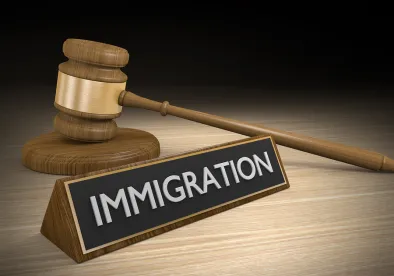Following is updated guidance related to President Donald Trump’s Executive Order (“EO”), “Protecting the Nation from Foreign Terrorist Entry into the United States,” issued January 27, 2017. These updates are based upon information available as of February 3, 2017.
FAQs on the Impact of the Executive Order Suspending Admission to the U.S. of Foreign Nationals From Certain Designated Countries
On January 27, 2017, President Donald Trump issued an executive order, “Protecting The Nation From Foreign Terrorist Entry Into The United States,” which suspended admission to the United States of foreign nationals from the following countries for a period of at least 90 days: Iran, Iraq, Libya, Somalia, Sudan, Syria, and Yemen. The executive order also suspended implementation of the Visa Interview Waiver Program (which is also known as drop-box). This order was effective immediately upon issuance. Several issues related to the order still require clarification. Below are answers to the most frequently asked questions (FAQs) related to the executive order.
Official guidance from U.S. federal agencies on implementation of this order may continue to be issued throughout the 90-day period. The information contained within these FAQs is based upon guidance available as of February 3, 2017, and we will continue to provide updates based on subsequent guidance.
Nonimmigrants (B-1, H-1B, L-1, O-1, E-3 etc.)
Q: I am a nonimmigrant visa holder from one of the designated countries, and I am currently in the United States. Will I be impacted?
A: The order suspends entry of nonimmigrant visa holders into the United States, but does not require nonimmigrant visa holders from the designated countries who are already present in the United States to depart the country.
Q: I am a nonimmigrant visa holder from one of the designated countries, and I am currently outside the United States. Will I be allowed to enter the country?
A: Admission to the United States will likely be denied at all ports of entry (air, land, and sea).
Q: I am from one of the designated countries and have a visa appointment scheduled at a U.S. Consulate abroad. May I still attend my visa appointment?
A: No. The U.S. Department of State has issued a statement confirming that, if you are from one of the designated countries and already have an appointment scheduled, you should not attend your appointment. The U.S. Department of State has advised that it will not permit entry to the embassy or consulate.
Q: Are any nonimmigrant visa categories excluded from this order?
A: The executive order does not suspend entry for foreign nationals traveling on diplomatic visas, North Atlantic Treaty Organization visas, C-2 visas for travel to the United Nations, and G-1, G-2, G-3, and G- 4 visas, even if these foreign nationals are from a designated country.
Q: I am a nonimmigrant visa holder from a designated country. I am currently abroad, and I have an urgent need to enter the United States. Are there any exceptions to the travel ban?
A: The executive order states that the secretaries of State and Homeland Security may, on a case-by-case basis, and when in the national interest, issue visas or other immigration benefits to nationals from the designated countries. U.S. Customs and Border Protection (CBP) has advised that both the U.S. Department of Homeland Security (DHS) and the U.S. Department of State (DOS) can review individual cases and grant waivers on a case-by-case basis if that individual’s admission to the United States is deemed to be in the national interest and if the individual does not pose a national security threat. However, CBP retains the sole authority on whether to admit an individual to the United States.
Neither the DHS nor the DOS has released guidance on the process by which an individual may apply for an exception, or the criteria that will be used to adjudicate these exceptions. Without official guidance on how a nonimmigrant may qualify for this exception, it is uncertain what documentation or circumstances may be deemed to warrant a waiver.
Q: I am a nonimmigrant visa holder from a non-designated country, but I have traveled to a designated country. Will I be allowed to enter the United States?
A: The executive order only suspends admission for nationals “from” a designated country. However, you may be subject to additional questions and review by CBP.
Lawful Permanent Residents (Green Card Holders)
Q: I am a lawful permanent resident and a national of a designated country and I am currently outside the United States. Will I be allowed to reenter the United States?
A: The U.S. government has clarified that lawful permanent residents are not within the scope of the executive order and should be admitted to the United States, even if presenting a passport from a designated country. Travelers may experience increased screening, questioning, and delays when applying for admission.
Q: What should I do if I am asked to abandon my lawful permanent resident status when I request admission to the United States?
A: Abandoning your green card can carry significant implications for your rights and options moving forward. Thus, individuals should carefully consider the significant consequences of such an action and should make such a decision only after becoming fully informed about their legal rights and options.
Q: I am a lawful permanent resident and a national of a non-designated country, but I have traveled to a designated country. Will I be allowed to reenter the United States?
A: The executive order only suspends admission for nationals from a designated country. However, you may be subject to additional questions and review by CBP at the port of entry.
Dual Citizens: United States and Designated Countries
Q: I am a dual citizen of the United States and one of the designated countries. May I travel internationally and reenter the United States?
A: The plain language of the executive order applies to nonimmigrant and immigrant entry and does not apply to United States citizens. You must present your U.S. passport at the port of entry.
Dual Citizens: Designated Country and Non-Designated Country
Q: I am a dual citizen of one of the designated countries, as well as a country not on the list, and I have a valid nonimmigrant visa. May I travel internationally and reenter the United States?
A: A U.S. Customs and Border Protection (CBP) FAQ states that foreign nationals who request admission may be treated according to the travel document they present. If your valid nonimmigrant visa was issued in a passport of a non-designated country, the CBP FAQ states that you may apply for admission, even if you hold dual citizenship with one of the designated countries. However, this FAQ is not legally binding. Individuals who hold dual citizenship with a designated country should expect increased questioning, screening, and delays when applying for admission.
Q: I previously held citizenship from one of the designated countries, but not anymore. I am now a citizen of a country not on the designated list. Will I be allowed to enter the United States?
A: The executive order applies to all individuals "from" a designated country. There is no definitive guidance regarding individuals who previously held citizenship with a designated country. As previously noted, although CBP has clarified that foreign nationals who request admission will be treated according to the travel document they present, this website posting is not legally binding. Individuals who previously held citizenship from a designated country, or who previously asserted a claim of citizenship to a designated country, can expect increased questioning, screening, and delays when applying for readmission. There is no guarantee of admission.
Q: I am a dual citizen of one of the designated countries as well as a country not on the list, and I need to apply for a nonimmigrant or immigrant visa to enter the United States. Will I be allowed to apply for a visa?
A: On February 2, 2017, the U.S. Department of State (DOS) announced that embassies and consulates may process visa applications and issue nonimmigrant and immigrant visas to eligible visa applicants who apply with a passport from a non-designated country, even if they hold dual nationality from one of the designated countries. Please follow the instructions you receive from the U.S. Embassy/Consulate at which you will apply. Individuals who hold dual nationality with a designated country should expect increased questioning, screening, and delays with respect to both visa applications and admission to the United States.
General Information
Q: How long will the travel ban be in effect?
A: The ban will last for at least an initial 90-day period from the date of the order (through April 27, 2017). However, the timeline may be extended.
Q: I have heard that implementation of the executive order has been limited by litigation and that some foreign nationals from designated countries who were detained were allowed to enter the United States. Does this mean I am safe to travel even if I am from one of the designated countries?
A: No. The U.S. Department of Homeland Security has stated that it will continue to implement the executive order. Admission to the United States will likely be denied to an individual who is a nonimmigrant from a designated country.
Visa Interview Waiver Program
Q: I am planning to renew my visa through the Visa Interview Waiver Program (VIWP), may I still do so?
A: The executive order suspends the VIWP, also known as the drop-box, requiring all nonimmigrant visa applicants to attend an interview unless an interview is not required by statute. However, the drop-box option may nonetheless remain available at certain U.S. Embassies and Consulates, as local procedures vary. Individuals hoping to renew their visas should follow any instructions from the U.S. Embassy/Consulate at which the individual will apply.
Q: Will the executive order affect my visa appointment interview if I am not from one of the designated countries?
A: Suspending the VIWP will place an additional burden on U.S. Consulates and Embassies (particularly high-volume posts) by increasing already extended interview wait times and processing times. Consequently, travel plans should take into account the additional processing time that may be needed for visa issuance.
Q: Does the executive order affect the Visa Waiver Program (VWP), which permits citizens of 38 countries to travel to the U.S. for business or tourism for up to 90 days without obtaining a visa?
A: No. The VWP was not addressed in the executive order. Citizens or nationals of the participating VWP countries are currently eligible to travel to the United States under the VWP, unless also a national of Iraq, Iran, Syria, or Sudan.
In addition, nationals of VWP countries who have traveled to or have been present in Iran, Iraq, Libya, Somalia, Sudan, Syria, or Yemen on or after March 1, 2011 (with limited exceptions for travel for diplomatic or military purposes in the service of a VWP country) are not eligible to be admitted to the United States under the VWP.
The text of the executive order is now published on the White House website: Protecting the National From Foreign Terrorist Entry Into the United States.






 />i
/>i
